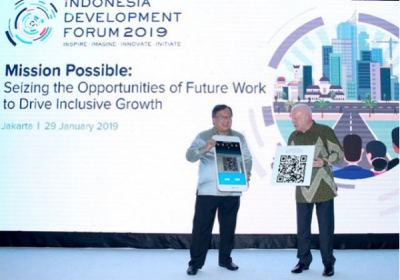IDF 2019, Finding Solutions for Decent and Productive Work
May 14, 2019
The Minister of PPN/Head of Bappenas, Bambang Brodjonegoro, and Australian Ambassador for Indonesia, Gary Quinlan, during Indonesia Development Forum 2019 launching on January 29, 2019, in Jakarta.
The Ministry of National Development Planning (PPN)/National Development Planning Agency (Bappenas) is once again holding the Indonesia Development Forum (IDF) on July 22-23 2019 in Jakarta. This year, IDF highlights the theme “Mission Possible: Seizing the Opportunities of Future Work to Drive Inclusive Growth”.
“We invite the participation of all stakeholders, from the media, NGO, experts, business actors, scholars, and others in the Indonesia Development Forum. IDF is not a one-way seminar, instead, it encourages ideas from the public”, said the Minister of PPN/Head of Bappenas, Bambang Brodjonegoro.
Minister Bambang said that this year’s IDF will focus on strategies to create good and productive jobs and to ensure that all people gain access to good work and other economic opportunities.
Indonesia is currently facing an increase in population, which will reach its peak in 2030. According to Bambang, the government will strive to use the demographic bonus to continue to promote economic growth. The key is to improve the quality of its human resources and create jobs.
“Demographic bonus does not come twice in a single lifetime. If not utilised appropriately, it will be difficult for us to escape the middle-income trap,” said Bambang.
Middle-income trap is a country’s failure to go up a level from low to high income. To prevent this, the government encourages all stakeholders to participate in IDF 2019, providing inputs on Indonesia’s workforce and human capital improvement.
IDF 2019 will explore various issues related to this main topic, which is divided into eight sub-topics, namely: Accelerating Structural Transformation; Reforming Technical Vocational Education and Training (TVET) System for Future Jobs; Creating Inclusive Employment Opportunities; Improving the Investment Climate for Employment Creation; Developing Globally Competitive Micro, Small, and Medium Enterprises; Fostering Social Enterprises; Developing Local Talent and Market; and Improving the Quality of Human Capital.
Indonesia Development Forum is an international conference held by Bappenas, with the support of the Australian Government through Knowledge Sector Initiative. Since its first inception in 2017, IDF has convened leaders from governments, the private sector, scholars, and civil society to discuss the solution of Indonesia’s key development challenges.
The Australian Ambassador for Indonesia, Gary Quinlan, said, “We hope this year’s IDF will support Indonesia in designing evidence-based policies to modernise Indonesian workforce.”
Industrial Revolution 4.0 Changing the Old Workforce Ways
Developing digital technology ushers the world into an industrial revolution 4.0 era, including Indonesia. “According to McKinsey data, 60 per cent of jobs in the world will shift to automation, and 30 per cent will be replaced by advanced machinery”, said Head of Bappenas, Bambang Brodjonegoro.
Minister Bambang added that this change will lead to opportunities, in that there will be 26 new jobs created owing to the rise of online commerce. The service and creative industry sector will be even more productive, thus opening job opportunities. With regards to this, the Indonesia Development Forum 2019 is held to find interesting ideas on work opportunities in the era of industry 4.0.
“This year’s IDF focuses on the strategy to create jobs, increase productivity, and ensure that all Indonesians have access to good jobs, in line with the era of industry 4.0,” continued Bambang.
Eight sub-topics made for IDF 2019 are expected to address future industrial challenges. Bambang explained that the solution to accelerate structural transformation is expected to be able to provide added value and competitiveness in all sectors.
The reform of the vocational education system is expected to meet market demand. This is why Minister Bambang stated that it is important to involve the business world to improve curriculum according to industrial needs. Bambang gave an example of the program of Technical and Further Education (TAFE) Institutions from Australia, which served as a workers’ forum to learn to build their capacity or learn new expertise in other fields.
The Australian Deputy Head of Mission for Indonesia, Allaster Cox, agreed with Minister Bambang, in that it is crucial to improve skills to answer for future job demands. As digital technology emerges, Australia and Indonesia are developing the service sector instead of relying on mineral resources and agricultural sector, as they did in the past. As a result, the education curriculum needs to be adapted to current needs.
“We see that access to education in Indonesia has improved, but not as strongly directed towards the industry. Access to education is important, but the result must also be useful for the industry,” said Allaster.
Allaster hopes that Indonesia and Australia, even other countries, can share experiences in addressing the global challenge in the workforce sector through the Indonesia Development Forum 2019.
IDF 2019 invites your submission of ideas and thoughts on the eight above mentioned topics in various forms, such as papers, pitches, arts and cultural performance, blogs, videos, and infographics. The submission is open from January 29 to March 29, 2019.
Indonesia’s Research Institutions Supporting the Development of the Electric Vehicle Industry
Indonesian Muslim Fashion and Cosmetics IKMs Shine at Dubai World Expo 2020
Govt Steps Up UMKM Transformation Efforts in the Midst of Pandemic Slowdown
Govt Encourages Promotion of IKM Products in Digital Era
Government Begins Developing Maritime Training Center in Makassar
Tweets by IDDevForum
